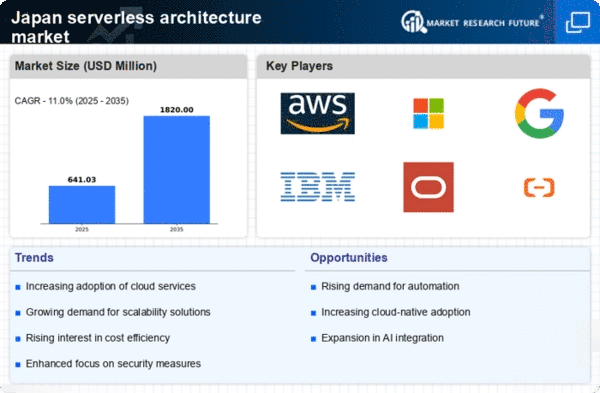Focus on Enhanced User Experience
In Japan, there is a growing focus on enhancing user experience, which is significantly impacting the serverless architecture market. Companies are increasingly prioritizing the development of applications that provide seamless and responsive interactions for users. Serverless architectures facilitate this by enabling rapid scaling and efficient resource management, ensuring that applications can handle varying loads without performance degradation. Recent surveys indicate that 70% of Japanese consumers consider user experience a critical factor in their engagement with digital services. As businesses strive to meet these expectations, the demand for serverless solutions that support high-performance applications is likely to increase, thereby driving growth in the serverless architecture market.
Rising Demand for Agile Development
The serverless architecture market in Japan is experiencing a notable surge in demand for agile development methodologies. Organizations are increasingly seeking to enhance their software development processes, aiming for faster deployment and improved scalability. This shift is driven by the need for businesses to respond swiftly to market changes and customer demands. According to recent data, approximately 60% of Japanese enterprises are adopting agile practices, which aligns with the capabilities offered by serverless architectures. By leveraging serverless solutions, companies can streamline their development workflows, reduce time-to-market, and foster innovation. This trend indicates a robust growth trajectory for the serverless architecture market, as more organizations recognize the potential of agile methodologies in conjunction with serverless technologies.
Integration of Artificial Intelligence
The integration of artificial intelligence (AI) into the serverless architecture market is becoming increasingly prevalent in Japan. Businesses are recognizing the potential of AI to enhance operational efficiency and improve decision-making processes. Serverless architectures provide the necessary flexibility and scalability to support AI applications, allowing organizations to process large volumes of data without the burden of managing infrastructure. Recent statistics suggest that the AI market in Japan is projected to reach ¥1 trillion by 2025, with a significant portion of this growth attributed to serverless solutions. This integration not only streamlines operations but also enables companies to innovate and develop AI-driven applications more rapidly, thereby propelling the serverless architecture market forward.
Shift Towards Microservices Architecture
The serverless architecture market is experiencing a shift towards microservices architecture among Japanese enterprises. This trend is largely influenced by the need for modularity and flexibility in application development. Microservices allow organizations to break down applications into smaller, manageable components, which can be developed, deployed, and scaled independently. As a result, serverless architectures are increasingly being adopted to support this modular approach. Data indicates that around 55% of Japanese companies are transitioning to microservices, which is expected to drive the demand for serverless solutions. This shift not only enhances operational efficiency but also aligns with the growing emphasis on continuous integration and delivery practices, further bolstering the serverless architecture market.
Government Initiatives Supporting Cloud Adoption
The Japanese government is actively promoting cloud adoption, which is positively influencing the serverless architecture market. Initiatives aimed at digital transformation and the establishment of smart cities are encouraging businesses to migrate to cloud-based solutions. The government has set ambitious targets for cloud adoption, with a goal of achieving 80% utilization of cloud services across public and private sectors by 2025. This supportive regulatory environment is likely to accelerate the adoption of serverless architectures, as organizations seek to leverage the benefits of cloud computing. As a result, The serverless architecture market is expected to experience substantial growth. This growth is driven by both public sector initiatives and private sector responsiveness to government policies.
















